Motor vehicle collisions are fairly common occurrences in Florida. However, in some cases, a car crash can result in serious injuries or fatalities. If you are dealing with the aftermath of a car wreck, you might be facing substantial losses and be uncertain of the laws that apply and your rights. Many Florida car accident laws might apply to your case and your ability to file a personal injury claim following your collision. Understanding some of these laws is important whether or not you have been involved in a car wreck. Here is some information from the attorneys at Lane & Glassman about the relevant Florida car accident laws and how they might affect your Florida car accident.
Under § 316.614, Fla. Stat. (2021), passengers riding in the front seats, drivers, and passengers under age 18 who are seated in the back seats are required to wear seat belts. Children ages 0 to 3 must be seated in a federally approved child car seat. Those who are four to five must either be seated in an approved child car seat or wear safety belts. Seat belts can greatly reduce your risks of injury in a motor vehicle crash and should always be worn by everyone in your vehicle.
There are several laws governing who must yield the right of way in different types of situations. Even if you are considered to have the right of way, you must still pay attention to your surroundings and attempt to avoid collisions.
Under § 316.003, Fla. Stat. (2021), the right of way is defined as the right of a pedestrian or vehicle to proceed in preference to another when the circumstances dictate based on the risk of a collision unless the preference is given. Under § 316.123, Fla. Stat. (2021), the car that stops first at a four-way stop has the right to go first.
Several Florida car accident laws dictate what you must do after a car accident. Under § 316.062, Fla. Stat. (2021), you must stop your vehicle in a safe place as close to the scene of the accident as possible. You must exchange your information with the other involved driver, including your driver’s license, insurance information, and contact information. You are also required to provide aid if anyone has been injured. If you fail to stop at the scene of an accident, you could be criminally charged.
Under § 316.027, Fla. Stat. (2021), you must call 911 and stay at the scene after an accident involving injuries or death and wait for the police to arrive. If you are involved in a property damage-only crash, you must also stay at the scene and exchange information under
§ 316.061, Fla. Stat. (2021).
Move your vehicle out of the roadway following an accident and turn on your hazard lights. In most cases, it is mandatory to call the police. Florida requires any accident involving $500 or more in property damage to be reported. With today’s vehicles, this means that most accidents are required to be immediately reported under § 316.065, Fla. Stat. (2021).
If you think that you might have been injured, you should seek medical attention immediately. Some people experience delayed symptoms because of being in shock or experiencing a rush of adrenaline, so even if you don’t think you are injured, you should still see your doctor for a medical exam as soon as possible.
Under § 324.021, Fla. Stat. (2021), all motorists in Florida must carry at least the following minimum types of automobile insurance:
It is a good idea for you to carry bodily injury liability (BI of $10,000 per person and $20,000 per accident. If you do not have BI coverage and seriously injure someone in a crash, you will have to post a bond with the state. If you don’t, your license will be suspended.
Florida is a no-fault state for auto accidents under § 627.7407, Fla. Stat. (2021). This means that if you are involved in an accident, you file a claim with your insurance company for coverage regardless of whether or not you were at fault. You will also file a claim for your injuries and property damage when the other motorist was at fault. However, if you were seriously injured, you can file a claim against the at-fault driver to recover compensation.
Florida’s injury statute of limitations is found at § 95.11, Fla. Stat. (2021) and is four years. This means that you will have no more than four years after your injury accident to file a lawsuit against the at-fault driver. If you wait too long, your claim will be time-barred, meaning you won’t be able to recover damages for your losses.
Under § 768.81, Fla. Stat. (2021), Florida has adopted a pure comparative fault rule for accidents. Under this law, you can still recover damages even if shared fault for your accident. However, your damages will be reduced by your percentage of fault. For example, if a jury returns a verdict in your favor of $100,000 but finds that you were 40% at fault, your net verdict will be $60,000.
The fault is initially determined at the scene by the responding police officer. Following a short investigation, the officer will decide who was to blame and issue a citation. If you file a lawsuit, however, fault will be determined according to negligence principles. Your attorney at Lane & Glassman and the insurance companies will investigate what happened to determine fault. This determination might be different than what the police officer stated in his or her report.
If you have been seriously injured in a Florida car accident because of the negligence of another driver, you should speak to the experienced car accident lawyers at Lane & Glassman. We have decades of experience helping motor vehicle accident victims recover fair compensation for their losses. Call us today for a free consultation at 954.874.3631.
